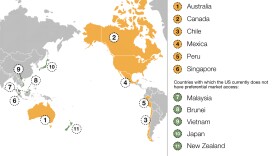By Duane Bolin
http://stream.publicbroadcasting.net/production/mp3/wkms/local-wkms-927030.mp3
Murray, KY – In the last moments of life, we often hear about seeing the light' and moving towards it. But what happens to a person when that light grows faint and they're suddenly pulled back to Earth? Commentator Dr. Duane Bolin has a new lease on life after a near-death experience. In this commentary, he shares this experience and references Emily Dickenson's epitaph, "Called Back."
One of my favorite Old Testament passages is the last section of Isaiah 40. "Do you not know? Have you not heard?" Isaiah asks. "The Lord is the everlasting God, the Creator of the ends of the earth. He will not grow tired or weary, and his understanding no one can fathom." And then Isaiah promises, "He gives strength to the weary and increases the power of the weak. Even youths grow tired and weary, and young men stumble and fall; but those who hope in the Lord will renew their strength. They will soar on wings like eagles; they will run and not grow weary, they will walk and not be faint."
Emily Dickinson's epitaph reads simply: "Called Back." At the end of a life of poetry and devotion, Dickinson believed she was called back into eternity. But what does one make of being called back into this world, to live and breathe, or as Isaiah said, to "run and not grow weary," to "walk and not be faint"?
On the sunny Thursday afternoon of April 29, I drove Cammie Jo to track practice at Stewart Stadium. Wesley was still at school and Evelyn had gone to Calvert City to visit her sisters. I had decided to finally do something about the shape of my physical condition, to begin an exercise program that had gone dormant for half a decade. As I drove home from Stewart Stadium, on a whim I turned the car around and headed back to Hibbet's sporting goods to buy a new pair of running shoes. Paid up, I drove home, changed into some running clothes and headed out the front door onto Earl Court.
I had walked for 30 minutes the evening before, so my intent was to walk again, to gradually build up my endurance until I could one day resume a running schedule that I had abandoned in 2005. Ever impatient, I thought that I could at least start out in a slow jog, so coming out of Earl Court I turned right onto Fairlane. I didn't get very far. Feeling dizzy, I sat down on the side of the street. I tried to go again, got up, and made it across the street, only to sit down again in the grass on the corner of Fairlane and 11th Street. I remember laying back in the grass and that is all I remember; I passed out. The next thing I remember was the face of a kindly paramedic who insisted that I be loaded into a waiting ambulance and taken to the emergency room.
It is that blank period between passing out and coming to that made all the difference. Alesia and Tony Knight, my next door neighbors, didn't know why they came home that way that day. They always went home by another way. In fact, Tony turned to Alesia and asked, "Why are we going this way?" "I don't know," Alesia said. It was then that they saw me stretched out on the grass at the edge of the street.
Tony backed up and Alesia, a trained nurse, got out and ran to my side while Tony called for an ambulance. I had no pulse, I had stopped breathing, and I was already turning blue, but Alesia knew just what to do. She administered CPR. When I didn't respond, Alesia beat me on the chest. "Don't do this to me," she said. She continued with the CPR and finally, only because of God and Alesia, my heart started beating again, my breathing resumed, and I came to. Neighbors and friends gathered around, including Raymond and Susan Sims, and another registered nurse who I still do not know by name.
The rest of the story is that a faulty aortic heart valve had shut down. I came out of the hospital fourteen days later with a new aortic valve and a pacemaker, along with a new appreciation for life and a list of questions that I must ponder. Why did Tony and Alesia Knight go home by another way on that particular day? Why was my life spared? How does one thank someone who has saved your life? What is it, after all, that I still need to accomplish in this old world? Why was I called back?
Dr. Duane Bolin teaches in the Department of History at Murray State University. If you have an opinion, interest or review you'd like to share with WKMS listeners, see guidelines on the commentaries page of our web site and send us an email.





